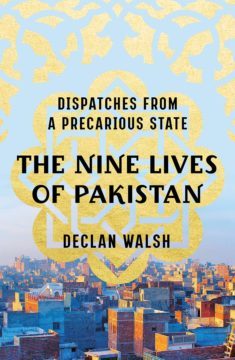Taimur Khan in Foreign Policy:
 A decade before the arrival of New York Times correspondent Declan Walsh’s The Nine Lives of Pakistan: Dispatches from a Precarious State—which was released in the United States on Nov. 23—another major book of long-form reportage about the country’s chaotic post-9/11 years was published: Nicholas Schmidle’s To Live or to Perish Forever. The two books open with anecdotes of the authors being suddenly ordered to pack their bags and expelled from the country after reporting stories that crossed a red line for Pakistan’s security services—Schmidle for reporting on the Pakistani mutation of the Taliban and Walsh for his coverage of the insurgency in the vast, rural Balochistan province. Walsh’s book comes more than seven years after he was kicked out of Pakistan in May 2013.
A decade before the arrival of New York Times correspondent Declan Walsh’s The Nine Lives of Pakistan: Dispatches from a Precarious State—which was released in the United States on Nov. 23—another major book of long-form reportage about the country’s chaotic post-9/11 years was published: Nicholas Schmidle’s To Live or to Perish Forever. The two books open with anecdotes of the authors being suddenly ordered to pack their bags and expelled from the country after reporting stories that crossed a red line for Pakistan’s security services—Schmidle for reporting on the Pakistani mutation of the Taliban and Walsh for his coverage of the insurgency in the vast, rural Balochistan province. Walsh’s book comes more than seven years after he was kicked out of Pakistan in May 2013.
In news reporting, most of the work must frustratingly remain in a journalist’s notebook. Walsh draws on these notebooks to write his book, finally able to give previous reporting trips the full literary treatment that they deserve. But it raises the question of whether reporting from Pakistan, some of it nearly 20 years old, gives readers new insights into a uniquely complex society. Walsh himself claims he will take the reader with him, retracing his steps, on a journey “deep into the psyche of the country.”
Walsh’s book is better than Schmidle’s, but the nearly identical opening scenes are a metaphor for a larger problem with writing about Pakistan, an ethnically diverse nation of more than 200 million people that is in constant flux. In the decade between the publication of these two major books of reportage that purport to explain Pakistan, the country itself has grown and evolved rapidly. The Pakistan discourse has still not caught up.
More here.
